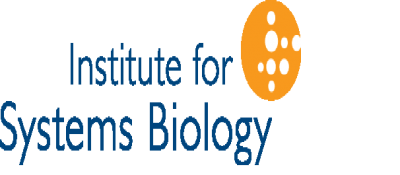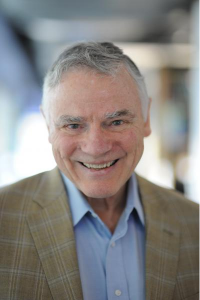Dr. Lee Hood
“Gosh you guys are really organized”
-Lee Hood, at the beginning of our interview
How did you get interested in the STEM field?
-
His father was an electrical engineer in Montana
-
Took high school courses and got intrigued by circuit design and engineering
-
Senior year he helped teach sophomore biology
-
Structure of DNA fascinated him
-
-
Moved to Cal Tech as an undergraduate (biggest cultural shock of his life)
-
Difficult because he had skipped some math classes
-
Good fundamental background
-
-
Hopkins had bio (which he was very interested in) and an accelerated two-year course
-
Returned to Cal tech for PhD
Why did you pursue an MD?
-
Immunology, cancer
-
Medical school provided him an opportunity to more deeply explore molecular biology
-
He learned other things (like how to be a doctor) but he mostly went to explore the science of the human body
-
Stuck with research because it is more interesting to him (less boring)
-
What made you go back to California?
-
He hates high temperature and humidity and loves the west coast to mountain climb/for the culture
-
Casual westerner more than competitive easterner
-
What made you become a professor?
-
Two main interests: Molecular immunology/technology development
-
Chemistry and mathematics and engineering were there and provided him the perfect environment
-
However, they were very traditionalist in their view of biology
-
At that time they were a small science institute
-
During this time he was pushing very hard for the human genome project
-
A lot of faculty was against this, which is part of the reason he left and came here(for the freedom)
-
-
-
Tal tech has really good students and teachers and is very high up there but you need to make sure that your school and environment matches your interests
-
Science is fun when you can interact and connect with the people around you
-
The social aspect is an integral part
-
What is your educational background?
-
Having a good foundation in science is extremely important and necessary
-
He spent three years in medical school to get this good foundation
-
You can’t be a grad student and go straight to changing the world, but it gives you the education
-
-
When straight from PhD to institute of health and skipped the post doc part
-
This gave him immediate materials and opportunities to get started on real work
-
-
Could have gone to the Vietnam war but helping wounded soldiers showed him that it was not very appealing
-
It was a very great opportunity to go to med school
“Studied” with these big names
-
Took lectures from Linus Pauling and richard Feynman
-
Lee thinks you teach conceptually, not through details
-
These two people were exceptional at doing this
-
Tell us about your work in cross-disciplinary science
-
When developing the automated DNA sequencer he saw a colleague who was good with DNA but had no engineering, molecular biology, chemistry background
-
He saw that if you put these experts together you can succeed at a project
-
To practice leading edge biology your really have to develop new technology that leads to new dimensions of discovery
-
-
Biology > technology > analytics
-
This leads to completely new concepts
-
This thinking has led to the creation of eight new companies
-
Raised several million dollars
-
-
This idea of an “innovation cycle” is at the central core of what everything is all about
-
“Maybe we should spread out the interrogation”
Elaborate on ISB’s unique educational outreach
“I’ve always thought that a scientist really has two key roles: one is discovery, and the other is education and teaching”
-
ISB can’t teach in a classical way like universities with lots of students
-
However, they can bring professional training to HS/young school teachers and spread information that way
-
-
Succeeded in changing elementary and middle school modules, but as soon as Bush came into office, the funding for high school change disappeared
-
By reaching out you can still have a very broad reach
-
Wife was very interested in science education (Logan education center if from her maiden name)
-
“We have a real responsibility to train and educate people”
-
We want an educated work force
-
We want people who are scientifically literate
-
We want to get that small percentage that have an affinity for science excited about science
-
Possible fourth area: Four P health care (predictive, preventive, personalized, proactive)
-
You need to educate the physicians to do this
-
Will bring it to 2,000 employees at Providence
-
-
Give these people an idea of what SB is and how this medicine works for Undergrad and under
-
-
Partnered with the Seattle School District to get grants that nobody thought was possible
-
It’s all about believing whether you can do something/determined optimism, not your restraints
-
Were you met with any obstacles because of this new way of thinking?
-
He was met with an attitude that didn’t understand just how transformational systems biology was going to be
-
Incompetent and defensive @ the UW
-
“Computation is only a tool, it’s not a big deal”
-
“They just never understood. Rather than fighting a….bureaucratic system that does everything as they did before, why not start something new?”
-
-
They thought a biologist would only need a couple little dinky computers
-
How does this have anything to do with that?
-
-
Bill Gates stood up for Lee and didn’t let his constraints stop him
-
Many were skeptical about whether systems biology was real
-
Many thought it was all hype
-
You gotta have optimism because you gon’ face a lot of haters
-
-
As an entrepreneur you go can go out and try new things
-
Science, management, recruiting talent
-
What was the motivation behind your most successful startup?
-
P4 differs from contemporary medicine
-
Proactive, focuses on individual, major focus on wellness (not disease), creating for each individual for deep, dense, dynamic personalized data clouds
-
About two things: Wellness, and disease (all resources goes into disease, 98%)
-
Scientific wellness is different (it normally has a bad connotation)
-
Quantify microbes, proteins, etc, + Fitbit for other information
-
Got an incredible data pool from his friends
-
A program that changed their life
-
If you have all this info you can figure things out for yourself without doctors
-
-
-
-
You need actionable professional coaches
-
Your genome is not your destiny, just your potential
-
This new company was oriented towards commercialization of this wellness project for consumers
-
Watched how it would grow without advertising, and it worked really well
-
Plan to dramatically expand
-
Will change pharmacies, biotechnology, nutrition
-
-
Has lead to a ton of new opportunities
-
Providence approached them
-
In very many states and prestigious but not academic (this caused them to block anything that might overlap), which limited them
-
Want to follow individuals with the cloud (for Alzheimer’s), both in prediction and guaranteed prevention, as well as with breast cancer and follow them through therapy on their way to remission, brain cancer (turn a chronic disease into a cured disease)
-
Hope to transform quality of life for people with breast cancer
-
-
-
A ton of people in the NW have MS and we are trying to figure out why
Tips for High School students
-
Learn to speak really well
-
One of the best classes he ever took was debate
-
His teacher never let him use notes because eye contact is critical
-
Tips on how to organize things
-
“You always have to extract the essence and make it simple and clear”
-
You should be able to give a talk without having to use the slides (they are just there as aids for the audience)
-
-
A leg up to convey important messages and to communicate yourself
-
In your communities, find your pioneers and leaders and assist them
-
Opportunities to help on projects downtown (Logan Center)
-
Ask yourself: why do I want to go to this college? And if you can accept that and adjust, you’ll succeed
-
Make sure you are passionate about what you do
-
-
Always have a clear idea of where you want to go and what you want to commit yourself to
-
It’s really important to think outside the box and not follow the crowd; be innovative
-
Associate yourself with really good people (find good schools, good mentors/people you’d like to learn science from)
-
-
Deterministic optimism is based on your confidence in going against the herd, and having that independence
-
You have to have that arrogant confidence that what you want to do is really worthwhile
-

